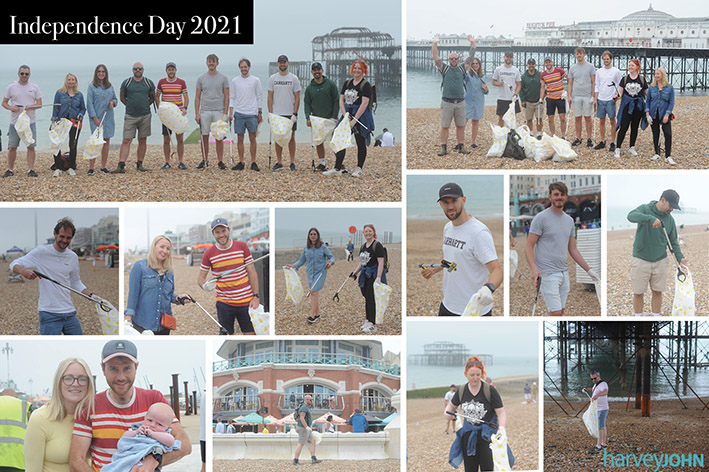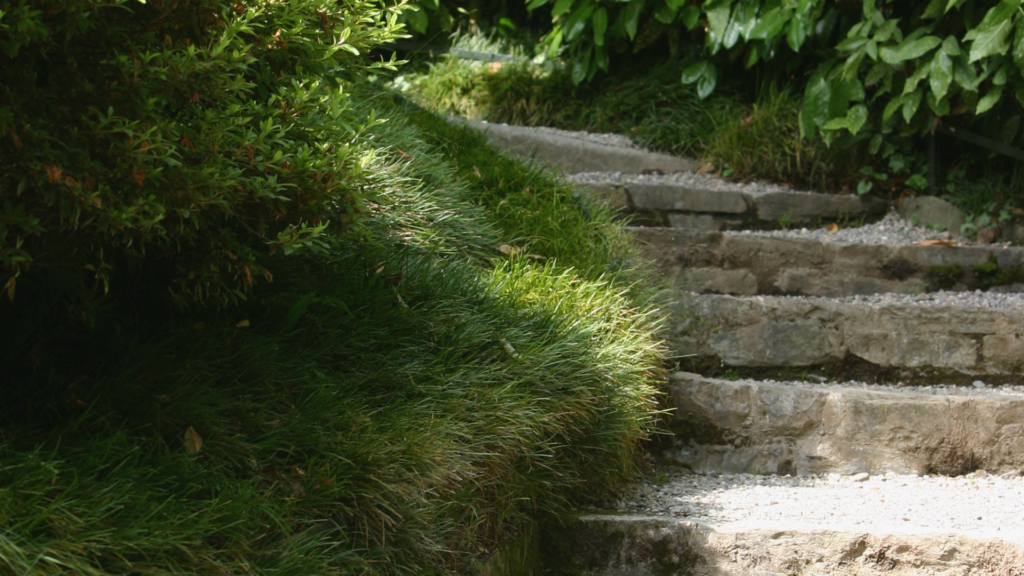Harvey John
Unit 2 Ferry Wharf
Hove Enterprise Centre
Basin Road North
Portslade, East Sussex
BN41 1BD
Scouring for litter on the Harvey John Brighton Beach Clean Day.

On the morning after our Independence Day celebrations, we meet on Brighton Beach to collect litter, in an attempt to keep our beaches clean.
A blast of fresh sea air helps clear groggy heads from the indulgences of the previous day. However, there is something life-affirming about doing your little bit to help the environment.
Despite the finest efforts of the city’s cleaning department, the sheer volume of litter thrown away on the beach ensures that dustbin bags soon start to fill. Last June, the Brighton and Hove council cleaners collected a staggering 11 tonnes in a single day from the beach!
One emotion you inevitably feel is anger. Why are people so selfish that they cannot be bothered to use a bin? A plastic bottle or drink can be left on the pebbles may not seem like a big deal, but the colossal volume of rubbish entering our seas and oceans is having a catastrophic impact on marine life.
Why do we do it?
Every day around 8 million pieces of plastic make their way into our oceans.
Sadly, beach litterers are not confined to a small minority of people.
A survey carried out by YouGov on behalf of Keep Britain Tidy showed that almost one in five people admit to leaving rubbish behind at the beach.
Apparently, the primary driver leading people to dump their rubbish at the beach was the fact that litter and rubbish were already present! It’s an unbelievable excuse. If someone else destroys our beaches with their crap, then I will do the same!
A company beach clean day is a great initiative. We wholly recommend that other businesses introduce such a day into their calendar. But one day of litter-picking is not enough.
The way to protect our coastline is to help out regularly as well as ensure that we are never guilty of littering, the ultimate crime of laziness.
Harvey John Managing Director David Waddell has introduced beach cleaning as part of his daily routine. When out dog-walking in the morning, he always has his litter picker at hand to collect rubbish.
If we can all be vigilant, we can make our beaches, streets and parks far better places. Aside from improving the appearance of our local environment, we can help with a very serious problem.
How litter is destroying our oceans and seas
One of the most active organisations for preserving our seas is Surfers Against Sewage. Apart from the fact that surfing through faeces is not particularly pleasant, the group cares passionately for marine life.
They produce influential reports on the dangers caused by littering and discarded fishing equipment.
Their Marine Litter Report explained that: Marine animals, from fish to dolphins, seabirds to seals, eat marine litter, mistaking plastic debris for food items – floating plastic bags for jellyfish, plastic nurdles (pellets) for fish eggs – which chokes them and blocks their digestive system, leading to starvation and death.
It also highlighted the fact that plastics never completely break down and are having a hugely negative impact: Plastics contain chemical additives, which when ingested, are introduced into the marine food web. These synthetic substances, such as phthalates and parabens, do not readily break down, and the toxins then biomagnify as they are transferred up the food chain as one species eats another.
The scale of the problem is impossible to overstate. The following statistics give a flavour of the tragedy:
- More than 1 million seabirds and 100,000 marine animals die from plastic pollution every year.
- 100% of baby sea turtles have plastic in their stomachs.
- There are now 5.25 trillion macro and micro pieces of plastic in our ocean & 46,000 pieces in every square mile of ocean, weighing up to 269,000 tonnes.
- The Great Pacific Garbage Patch is around 1.6 million square kilometres – bigger than Texas.
Source: Codon Ferries
These are sobering statistics. You might think that a crisp packet doesn’t matter much. It does. You’ll be contributing to this unprecedented assault on marine life.
Take your litter home – or even better, grab a litter picker and be part of the solution!
Author

With 15 years management experience in specialist finance & professional services recruitment across the UK, Sandra brings a depth of understanding to our team’s operational activities and is passionate about promoting excellence in everything we do.
She is also responsible for the recruitment, induction and development of our team and is always open to discussing opportunities with people who share our values and approach.





